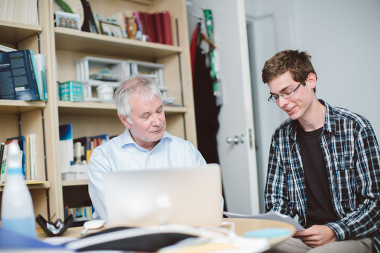Why Oxford?
You may already know you want to study Computer Science at university, but may be wondering what distinctive features studying Computer Science at Oxford has. Read on to find out more about the unique learning environment of the historic University.
Small group tuition
 You will receive tuition in very small groups of two or three students, from internationally recognised subject experts, through the world-famous Oxford tutorial system. Usually, a tutorial sees you and one or two other students getting together with a tutor to discuss your work for an hour. You typically have two or three tutorials or classes each week. It is this method of learning that sets Oxford apart: few universities can match this level of personal tuition, which is designed to allow all students with the right potential, whatever their school background, to reach the same level of study in their subject. Our tutorials are largely given by members of academic staff, not graduate students.
You will receive tuition in very small groups of two or three students, from internationally recognised subject experts, through the world-famous Oxford tutorial system. Usually, a tutorial sees you and one or two other students getting together with a tutor to discuss your work for an hour. You typically have two or three tutorials or classes each week. It is this method of learning that sets Oxford apart: few universities can match this level of personal tuition, which is designed to allow all students with the right potential, whatever their school background, to reach the same level of study in their subject. Our tutorials are largely given by members of academic staff, not graduate students.
Generous financial provision
Oxford offers generous financial assistance to UK students from lower income households to help with the cost of undergraduate study. A variety of scholarships and prizes are available during the course of the degree. Find out more.
You pay for accommodation and food, although this is often heavily subsidised. Colleges provide a wide variety of accommodation and meal options. Find out more.
Oxford is a compact city, and many of the colleges, departments, libraries and other facilities are a short walk or bike ride away so there is no need to spend money on public transport in Oxford.
Every Oxford student has access to the Bodleian Library. It's a copyright library, which means that when a book or journal is published in the UK, the publisher has to give the library a copy. With over 153 miles of shelving, you're pretty much able to find any book you could want there!
Terms at Oxford are only 8 weeks long. Some of our students choose to gain work experience, and will do summer internships. Read more about our students' summer internships.
Cutting-edge science in a historic (and central) setting
 The Bodleian Library
Oxford is the oldest university in the English-speaking world, and has been educating world-changing leaders for over 800 years. Oxford is a lively and beautiful city, with much to offer. A relatively compact city, most colleges (plus accommodation) and departments (including us) are in and around the city centre, so only a short walk or cycle ride away from other college and University buildings. Oxford is just 57 miles (90 km) northwest of London, so you can be in the capital in an hour by train.
The Bodleian Library
Oxford is the oldest university in the English-speaking world, and has been educating world-changing leaders for over 800 years. Oxford is a lively and beautiful city, with much to offer. A relatively compact city, most colleges (plus accommodation) and departments (including us) are in and around the city centre, so only a short walk or cycle ride away from other college and University buildings. Oxford is just 57 miles (90 km) northwest of London, so you can be in the capital in an hour by train.
View the Oxford University map.
Excellent facilities
We have excellent facilities both for academic work and for sporting, artistic, creative and social activities. Our courses are intense, but you will still have time to try out new hobbies and pursue other activities. There are also extensive academic support facilities — from the careers service and the Bodleian libraries to the world's most famous debating society, the Oxford Union, and the Oxford University Student Union. There is also dedicated support for international students.
Support from your college
 The University is divided up into more than 35 different colleges. This collegiate system is
at the heart of the University's success, giving students and academics the benefits of
belonging to both a large, internationally renowned institution and to a smaller,
interdisciplinary, college community. Each college provides accommodation and food,
as well as clubs, societies, and facilities like a dining room, bar and common room. Colleges
are, however, much more than just accommodation. The relatively small number of
students allows for close and supportive personal attention to be given to your induction,
development and welfare. There's lots of advice available on choosing a college.
The University is divided up into more than 35 different colleges. This collegiate system is
at the heart of the University's success, giving students and academics the benefits of
belonging to both a large, internationally renowned institution and to a smaller,
interdisciplinary, college community. Each college provides accommodation and food,
as well as clubs, societies, and facilities like a dining room, bar and common room. Colleges
are, however, much more than just accommodation. The relatively small number of
students allows for close and supportive personal attention to be given to your induction,
development and welfare. There's lots of advice available on choosing a college.
Interview process
You will be interviewed online by at least two different colleges over a few days in December. During this time, tutors can assess your academic potential, your motivation and enthusiasm for the subject(s), and how you engage with ideas beyond the scope of your school or college syllabus. Some of the teaching in Oxford takes place in small classes or tutorials, and these interviews also give our tutors the opportunity to assess your ability to study, think and learn. You will find out in January whether you have a place.
